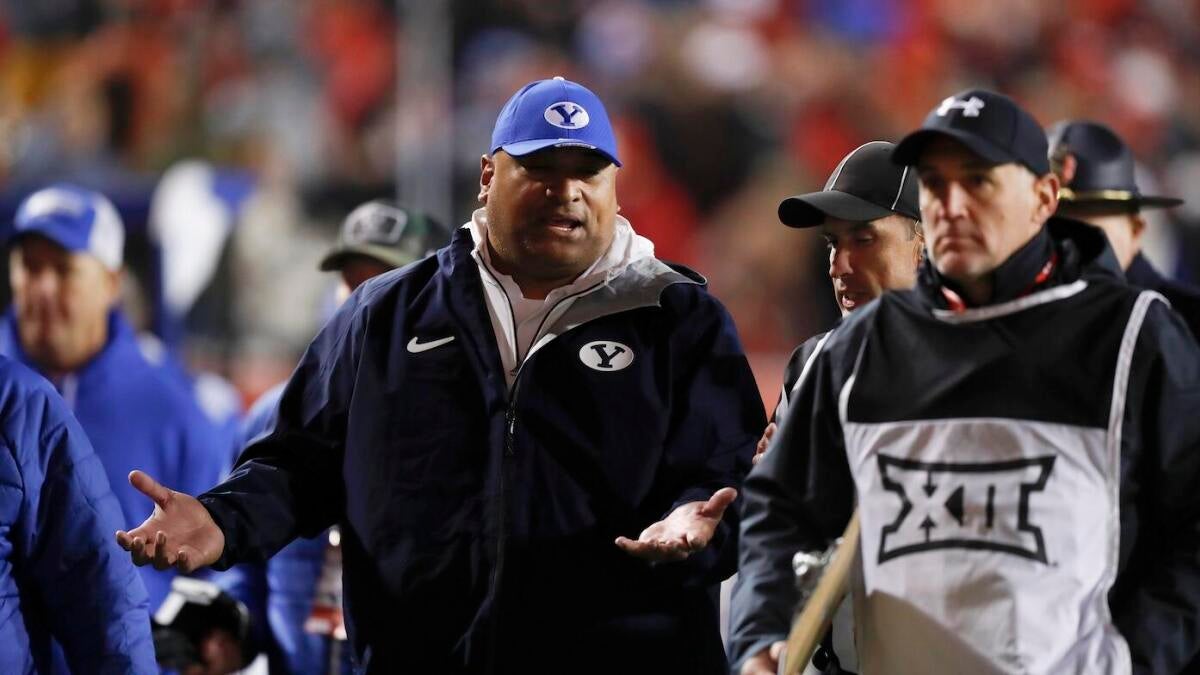The world of college football is often characterized by its unpredictability, but few stories have captured the attention of fans and analysts alike as much as the tumultuous transfer of Jake Retzlaff from BYU. A quarterback who once seemed destined for stardom, Retzlaff’s journey has been marked by both on-field brilliance and off-field turmoil, culminating in a transfer decision that has sent shockwaves through the Big 12 Conference. This narrative is not just about one player’s career but also reflects broader trends in college football, including the growing influence of the transfer portal and the critical role of quarterbacks in shaping a team’s success.
From Breakout Star to Center of Controversy
Jake Retzlaff’s rise at BYU was nothing short of meteoric. In 2024, he led the Cougars to an impressive 11-2 record, showcasing his dual-threat capabilities with nearly 3,000 passing yards, 20 touchdowns, and over 400 rushing yards. His performance accounted for 66% of BYU’s total offensive output, making him the undisputed leader of the team. However, this success was abruptly overshadowed by a civil lawsuit alleging sexual assault from an encounter in November 2023. The lawsuit, which was eventually dismissed by both parties in June 2025, cast a long shadow over Retzlaff’s future with the program. Despite the legal resolution, the allegations and the subsequent scrutiny seemed to weigh heavily on his decision to transfer, highlighting the delicate balance between athletic performance and personal conduct in the world of college sports.
The Transfer Portal Beckons: Navigating Eligibility and New Beginnings
Retzlaff’s decision to transfer, announced just two months before the start of the 2025 season, was a significant blow to BYU and a boon to other programs eyeing his talents. The timing of his transfer raised questions about his eligibility for the 2025 season, as missing the NCAA transfer portal deadline typically complicates immediate eligibility. However, reports suggest that Retzlaff has a viable path to gaining eligibility at his new program, potentially through a waiver based on the unique circumstances of his departure from BYU. Several Power 5 programs have expressed interest in acquiring his services, recognizing the potential impact he could bring to their quarterback room. This scenario underscores the fluid nature of the transfer portal, which has become a critical tool for players seeking new opportunities and for teams looking to bolster their rosters.
The BYU Quarterback Room: A Void and a Competition
With Retzlaff’s departure, BYU is left with a significant void at the quarterback position. The Cougars, who had pinned their hopes on Retzlaff to lead their offense, are now scrambling to identify a capable replacement. The competition for the starting role is expected to be intense, with several players vying for the opportunity during the summer months and into fall camp. The lack of an established starter creates uncertainty and adds pressure to the coaching staff to make the right decision. The success of the 2025 season may hinge on the ability of the new quarterback to quickly adapt to the system and command the offense effectively. This situation highlights the importance of quarterback stability in achieving success in college football, as teams that can consistently develop and retain talented quarterbacks are more likely to contend for championships.
Big 12 Implications: A Shift in the Competitive Landscape
Retzlaff’s transfer has implications that extend beyond the BYU program, potentially reshaping the competitive landscape of the Big 12. With Retzlaff at the helm, BYU was expected to be a formidable contender in the conference. His departure significantly diminishes their offensive firepower and raises concerns about their ability to compete for a Big 12 title. The absence of a proven quarterback may force BYU to adjust their offensive strategy, potentially emphasizing the running game or adopting a more conservative passing attack to mitigate the inexperience at the quarterback position. This shift could make BYU a less explosive and predictable team, potentially impacting their win-loss record and their standing in the conference.
The Broader Context: Transfer Portal and the Modern Quarterback
Jake Retzlaff’s transfer is a microcosm of the broader trends shaping college football. The transfer portal has become an increasingly influential factor, empowering players to seek new opportunities and changing the dynamics of team building. Quarterbacks, in particular, are highly sought-after commodities, and their decisions to transfer can have a dramatic impact on the fortunes of their former and future teams. The Retzlaff saga highlights the complex interplay of factors that can influence a player’s decision to transfer, including on-field performance, off-field issues, and the pursuit of a better opportunity. It also underscores the importance of quarterback stability in achieving success in college football. Teams that can consistently develop and retain talented quarterbacks are more likely to contend for championships, while those that struggle in this area may find themselves at a competitive disadvantage.
A Quarterback Conundrum
The transfer of Jake Retzlaff from BYU represents a significant turning point for the Cougars. A promising season derailed by controversy has led to a quarterback shakeup and uncertainty about the team’s prospects in the Big 12. As Retzlaff embarks on a new chapter in his college football career, BYU is left to grapple with the challenge of replacing a key player and navigating a rapidly evolving landscape. The resolution of the quarterback battle in Provo will undoubtedly be a key storyline to watch as the 2025 season unfolds. This narrative is a reminder of the complexities and challenges that define the modern college football experience, where success on the field is often intertwined with off-field dynamics and the ever-changing landscape of player movement.

